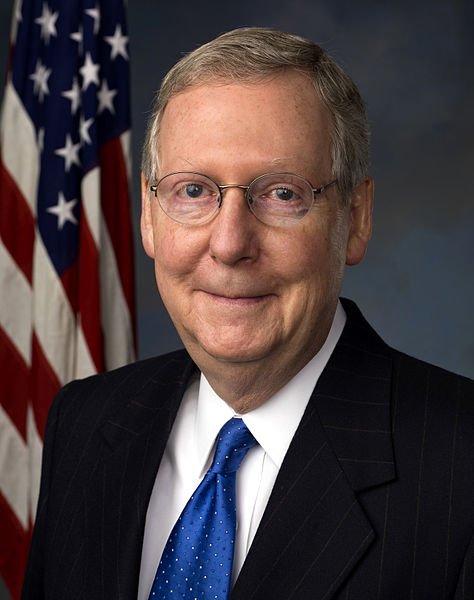Senate Majority Leader MItch McConnell (R-KY) announced today with Minority Leader Charles Schumer (D-NY) that Senate leaders have agreed to a two year budget deal. McConnell has promised there will be a debate on the Senate floor on DACA and immigration in exchange for support from the Democrats.
McConnell said in a statement, “I am pleased to announce that our bipartisan, bicameral negotiations on defense spending and other priorities have yielded a significant agreement.” Schumer likewise thanked his Republican counterpart.
The agreement comes as the temporary funding agreement made by Congress last month to end the three day shutdown is close to expiring. If the new measure does not pass the House, the government could once again shut down on Friday; the stopgap funding bill passed last month only funds the government through Feb. 8.
McConnell highlighted in his statements that the two year budget deal would increase defense spending by $80 billion over the next two years,“For the first time in years, our armed forces will have more of the resources they need to keep America safe. It will help us serve the veterans who bravely served us.” The two year budget deal proposed by the Senate also includes $4 billion for rebuilding VA hospitals
Between wildfires in California and multiple hurricanes, 2017 saw a great deal of disaster and destruction to life and property. The budget deal tries to address some of these issues by allocating between $80 and $90 billion for disaster relief, welcome news for families and businesses in Florida, Puerto Rico, and Texas.
The proposed budget also grants a four year extension to the Children’s Health Insurance Program (CHIP), considered a win in the Democrat’s column. Schumer said, “American families with children who benefit with CHIP will now be able to rest easy for the next decade.” The stopgap spending bill passed last month extended CHIP for 6 years. If the two year budget deal passes, CHIP could be funded for a minimum of 10 more years.
More good news on the healthcare front, the two year budget deal approves $8 billion in funding for community health centers that have taken a financial beating. The Senate agreement also allots $2 billion to fund research efforts at the National Institute of Health.
The bill is not exactly in line with President Trump’s budget request for 2018, called “ A New Foundation for American Greatness.” For example, it sets the nondefense funding cap at $117 billion higher that the President’s request.
Increasing military funding has been a major goal of the Trump administration. The President’s budget request claims this administration inherited the smallest Army since before World War II and the oldest planes in the Air Force. McConnell’s bill fails to hit the numbers set by the President, which aimed at a $52 billion increase to defense spending from the 2017 budget.
President Trump has been vocal about the opioid addiction epidemic in the US. The President had requested $12.1 billion for treatment and prevention efforts. $10.8 billion would specifically be used for treatment, according to the President’s request, a 2% increase from 2017. The Senate bill only earmarks $6 billion for the fight against opioid addiction.
The President had famously requested a $1 trillion budget from infrastructure projects. The Senate bill only allocates $20 billion for infrastructure.
The deal does not include an increase to the debt ceiling. Members of Congress have discussed adding this provision, but doing so could threaten the bill; increasing the debt ceiling would alienate the more conservative members of the House. Estimates hold that the US will surpass the current debt ceiling as early as next month, making this a pressing issue. The debt ceiling is still under congressional negotiation.
The bill increases spending by $300 billion, something conservative members of the House, particularly members of the House Freedom Caucus, are anticipated to reject. This means Ryan needs to solicit support from the otherside of the aisle to ensure success.
Schumer’s counterpart in the House, Nancy Pelosi (D-CA), has indicated that she will not support the bill unless Speaker Paul Ryan (R-WI) commits his willingness to reconsider DACA legislation, in line with McConnell’s agreement with Schumer. DACA, Deferred Action for Childhood Arrivals, is set to expire next month, and would put hundreds of thousands of individuals who entered the country illegally as children at risk for deportation. Reports from the White House indicate that President Trump will let Obama’s executive action expire.
House Minority Leader Pelosi was interrupted in the middle of a three hour speech on the House floor by McConnell’s announcement. Pelosi later issued a statement which read:
This morning, we took a measure of our Caucus because the package does nothing to advance bipartisan legislation to protect Dreamers in the House. Without a commitment from Speaker Ryan, comparable to the commitment from Leader McConnell, this package does not have my support.
Last month’s government shutdown was hardly a good PR move for the Democrats. Most Democrats no longer seem willing to drive the government into another shutdown, especially with the 2018 midterm elections looming on the horizon.
President Trump has continued to take a tough stance on immigration. Tuesday he tweeted, “We need a 21st century MERIT-BASED immigration system. Chain migration and the visa lottery are outdated programs that hurt our economic and national security.” This week, the President threatened another shutdown saying, “I would shut it down over this issue. If we don’t straighten out our border, we don’t have a country.”
President Trump has offered a DACA deal in exchange for immigration reforms and border wall.
The two year budget deal has technically not yet passed the Senate, but with the support of Schumer and McConnell it is expected to clear. Tuesday, the House passed another stopgap spending bill that would fund the government through March 23 and fund the military for a full year. The House bill is not anticipated to pass the Senate.




